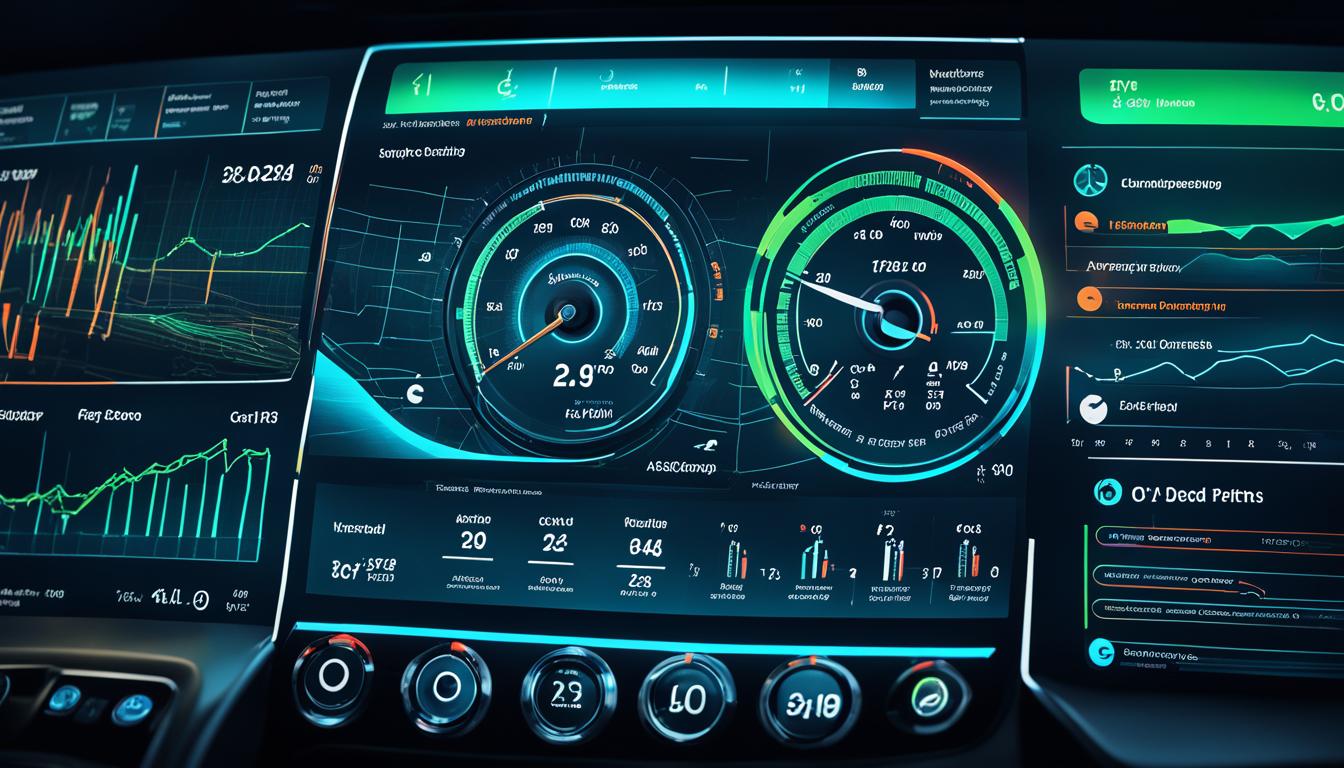The automotive industry is undergoing a remarkable transformation, driven by the integration of technologies like Artificial Intelligence (AI), Machine Learning (ML), Big Data, and the Internet of Things (IoT). These technologies are revolutionizing vehicles, turning them into intelligent machines that rely on data insights for optimal performance and enhanced safety. One of the key enablers of this revolution is Big Data, which has the power to unlock valuable information hidden within the vast amount of data generated by connected cars.
Connected cars generate an astonishing 25 GB of data per hour, thanks to various sources such as GPS, sensors, cameras, and ECUs. This real-time data holds immense potential for the automotive industry. By effectively analyzing and processing this data using tools like Apache Hadoop, Tableau, and Splunk, automotive companies can make data-driven business decisions, improve the driving experience, and enhance safety measures.
For instance, Hyundai, a leading automotive manufacturer, has been investing in Big Data since 2012 and has successfully leveraged it to optimize resource utilization and improve logistics. Along with this, Big Data enables features like timely over-the-air software updates, predictive maintenance, and accident prevention, creating a more efficient and safer driving environment.
As the automotive industry moves towards autonomous vehicles, Big Data will continue to play a crucial role. It will be instrumental in enabling a connected future where vehicles seamlessly interact with their surroundings, making travel more efficient, safer, and enjoyable for everyone.
Key Takeaways:
- Big Data revolutionizes the automotive industry, making vehicles intelligent machines that rely on data insights for optimal performance and safety.
- Connected cars generate huge amounts of data, which can be processed and analyzed to make data-driven business decisions.
- Automotive companies, like Hyundai, are already leveraging Big Data to optimize resource utilization and improve logistics.
- Big Data enables features like over-the-air software updates, predictive maintenance, and accident prevention.
- Big Data will play a crucial role in enabling a connected future where autonomous vehicles interact seamlessly with their surroundings, making travel more efficient and safer.
Cutting-Edge Trends in Big Data for the Automotive Industry
Big Data and analytics are driving several transformative trends in the automotive industry. Let’s explore the cutting-edge applications of Big Data that are reshaping the way cars are manufactured, maintained, and experienced.
Predictive Maintenance: Avoiding Costly Breakdowns
One of the significant advancements in the automotive industry fueled by Big Data is predictive maintenance. Thanks to sensors and advanced data analytics, automakers can accurately predict component failures and proactively address maintenance needs. By leveraging real-time data, automotive companies can identify signs of wear and tear and schedule timely repairs or replacements, minimizing downtime and avoiding costly breakdowns.
Connected Cars: Unlocking New Possibilities
Connected cars are revolutionizing the driving experience, thanks to Big Data. Real-time data on vehicle performance and the surrounding environment enable smart navigation and traffic management. With the help of sensors and cameras, cars can share information on road conditions, traffic congestion, and even find available parking spots. This interconnectedness empowers both drivers and transportation authorities to make informed decisions, optimizing travel routes and enhancing overall efficiency.
Advanced Driver Assistance Systems: A Safer Journey
Big Data plays a vital role in powering advanced driver assistance systems (ADAS) that enhance safety on the roads. By leveraging data from sensors and cameras, ADAS features like adaptive cruise control, lane departure warnings, and collision avoidance systems can be developed. These systems continuously analyze data to provide real-time insights and alerts, helping drivers make better-informed decisions and prevent accidents.
Personalized In-Car Experiences: Tailored for You
Automakers are leveraging the power of Big Data to create personalized in-car experiences that cater to individual preferences and needs. By capturing driver behavior data, health metrics, and other contextual information, vehicles can adjust various settings automatically, such as seat position, temperature, and music preferences. This level of personalization enhances comfort, convenience, and overall driving satisfaction.
Optimized Supply Chains and Fuel Efficiency: Smarter Operations
Big Data analytics is transforming supply chain management in the automotive industry. By analyzing vast amounts of data, automakers can optimize their supply chains, forecast demand accurately, and streamline production processes. This data-driven approach helps reduce costs, improve inventory management, and minimize waste. Furthermore, by analyzing fuel consumption patterns and vehicle performance data, automakers can implement strategies to enhance fuel efficiency, reducing carbon emissions and contributing to a more sustainable future.
Telematics and Insurance: A Personalized Approach
Big Data and telematics are reshaping the insurance landscape. By analyzing driving behavior data collected from connected cars, insurance companies can offer personalized insurance premiums based on individual driving habits. Safer drivers can benefit from reduced premiums, while riskier drivers may face higher rates. This personalized approach encourages safer driving practices and provides fairer insurance pricing.
Autonomous Driving: A Data-Driven Future
The journey towards autonomous driving heavily relies on Big Data. Data from sensors and cameras are essential in training AI algorithms for navigation, object recognition, and safety. By continuously analyzing and learning from massive amounts of data, self-driving cars can make informed decisions and provide a safe and reliable driving experience. Big Data is propelling the development of autonomous vehicles, paving the way for a connected, intelligent future.
Uncovering Consumer Insights: Shaping the Future
Big Data holds immense potential for understanding consumer behavior and preferences in the automotive industry. By analyzing vast amounts of data, automakers can uncover deep consumer insights, providing valuable information for product development, marketing strategies, and targeted advertising. These insights allow automotive companies to create tailored experiences and vehicles that resonate with consumers, driving innovation and staying ahead in a competitive market.
Automotive Cybersecurity: Protecting Against Threats
As vehicles become more connected and reliant on data, automotive cybersecurity is of paramount importance. Big Data analysis plays a significant role in identifying potential cyber threats and implementing robust security measures. By continuously monitoring data patterns and detecting anomalies, automakers can proactively combat cyber threats, ensuring the safety and security of connected vehicles and their occupants.
A Glimpse into the Future
The transformative power of Big Data in the automotive industry is reshaping the way vehicles are manufactured, maintained, and experienced. From predictive maintenance and connected cars to personalized in-car experiences and autonomous driving, Big Data enables innovative solutions that enhance safety, efficiency, and customer satisfaction. As technology continues to advance, the possibilities for leveraging Big Data in the automotive industry are boundless, driving us towards a data-driven future of automotive excellence.
How Big Data is Revolutionizing Decision Making in the Automotive Industry
Big Data is transforming the decision-making process in the automotive industry, empowering companies to make data-driven business decisions that optimize resource utilization, drive innovation, and improve efficiency. Automotive manufacturers, such as Hyundai, are harnessing the power of Big Data to gain valuable insights and make informed decisions in various areas of their operations.
By analyzing data from diverse sources, automakers can identify crucial patterns and trends, enabling effective logistics optimization and error recognition. For instance, through logistics optimization analysis, automotive companies can streamline their supply chains, reducing costs and improving delivery times.
Big Data analytics provides automakers with better insights into customer behavior and market trends, enhancing their understanding of consumer preferences and enabling the development of more targeted strategies. This data-driven approach helps automakers nurture customer loyalty and drive innovation, resulting in more efficient and desirable products.
“Big Data analytics provides automakers with better insights into customer behavior and market trends, enhancing their understanding of consumer preferences and enabling the development of more targeted strategies.”
Predictive analytics leverages Big Data to anticipate future trends and make data-driven strategies, allowing automotive companies to stay ahead of the curve. By utilizing predictive analytics tools, automakers can make accurate predictions regarding market demand, enabling efficient production planning and inventory management.
Optimizing resource utilization is another area where Big Data plays a crucial role. By analyzing real-time data on machine performance and energy consumption, automakers can identify opportunities to optimize production processes, reduce waste, and drive cost-efficiency.
Furthermore, the effective utilization of Big Data enables automakers to develop innovative features and technologies that improve overall customer satisfaction. By understanding customer needs and preferences through data analysis, automakers can create personalized in-car experiences that exceed customer expectations.
Big Data also facilitates continuous improvement by providing automakers with valuable feedback on product performance and consumer satisfaction. By collecting and analyzing data from various sources, including customer feedback and vehicle telemetry, automakers can identify areas for improvement and develop data-driven strategies to enhance their products, services, and customer support.
With its ability to unlock valuable insights and drive innovation, Big Data is revolutionizing the decision-making process in the automotive industry. By embracing a data-driven approach, automakers can make informed business decisions, optimize resource utilization, and enhance overall efficiency, leading to a more competitive and customer-centric industry.
The Impact of Big Data in the Automotive Industry
Table: Examples of Big Data-driven Strategies in the Automotive Industry
| Area | Example |
|---|---|
| Manufacturing | Optimizing production processes based on real-time machine data |
| Logistics | Streamlining supply chains through data-driven optimization |
| Customer Insights | Developing personalized in-car experiences and targeted marketing campaigns |
| Predictive Analytics | Anticipating market demand and optimizing production planning |
| Continuous Improvement | Utilizing customer feedback and telemetry data for product enhancement |
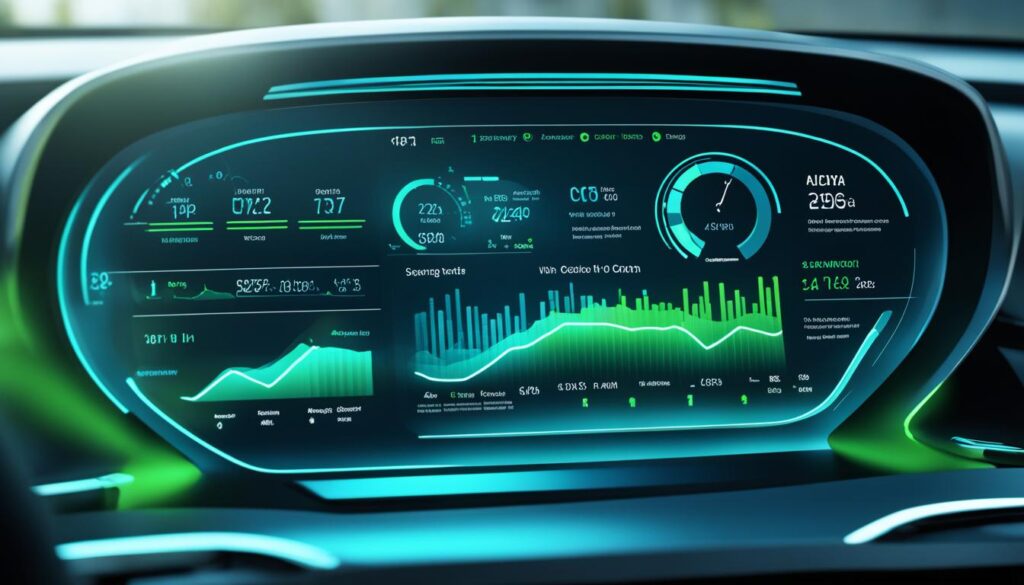
Through the effective implementation of Big Data analytics, the automotive industry can unlock its full potential, driving innovation, efficiency, and better insights. By leveraging data-driven strategies and predictive analytics, automakers can navigate the evolving landscape of the automotive industry, ensuring their continued success in an increasingly data-driven world.
The Role of Big Data in Manufacturing and Maintenance
Big Data plays a significant role in enhancing automotive manufacturing and maintenance processes. By leveraging data analytics, manufacturers can improve quality control, optimize production processes, and boost overall manufacturing efficiency.
In the realm of manufacturing, data collected from sensors and other sources can be analyzed to identify potential issues and enhance quality control measures. This enables automakers to detect and address manufacturing defects early on, ensuring that only high-quality vehicles reach the market.
Moreover, Big Data analytics helps manufacturers optimize production processes by analyzing data about equipment performance, workflow efficiency, and supply chain logistics. By identifying bottlenecks and streamlining operations, automakers can reduce costs and improve overall manufacturing efficiency.
When it comes to maintenance, predictive analytics powered by Big Data play a crucial role in proactive maintenance strategies. Machine learning models analyze sensor data to track the condition of critical components like brakes, battery, and engine. This allows automakers to anticipate maintenance needs and perform timely service, thereby avoiding breakdowns and enhancing vehicle reliability.
Wear and tear analysis is another area where Big Data analytics makes a difference. By analyzing data on component degradation and usage patterns, automakers can determine the optimal time for servicing and part replacement. This not only helps avoid sudden breakdowns but also prolongs the lifespan of vehicle components, saving both time and money.
Overall, Big Data analytics enables automakers to implement proactive maintenance strategies, optimize manufacturing processes, and enhance the overall quality and reliability of vehicles.
Benefits of Big Data in Manufacturing and Maintenance:
- Improved quality control
- Optimized production processes
- Enhanced manufacturing efficiency
- Proactive maintenance strategies
- Reduced risk of breakdowns
- Extended lifespan of vehicle components
By harnessing the power of Big Data, automakers can optimize both manufacturing and maintenance processes, resulting in higher-quality vehicles, improved customer satisfaction, and increased operational efficiency.
Big Data’s Impact in Manufacturing and Maintenance
| Area | Benefits |
|---|---|
| Manufacturing | Improved quality control and production efficiency |
| Maintenance | Proactive maintenance, reduced breakdowns, and extended component lifespan |
Big Data’s role in manufacturing and maintenance is essential for the automotive industry to achieve optimal performance, cost-efficiency, and customer satisfaction.
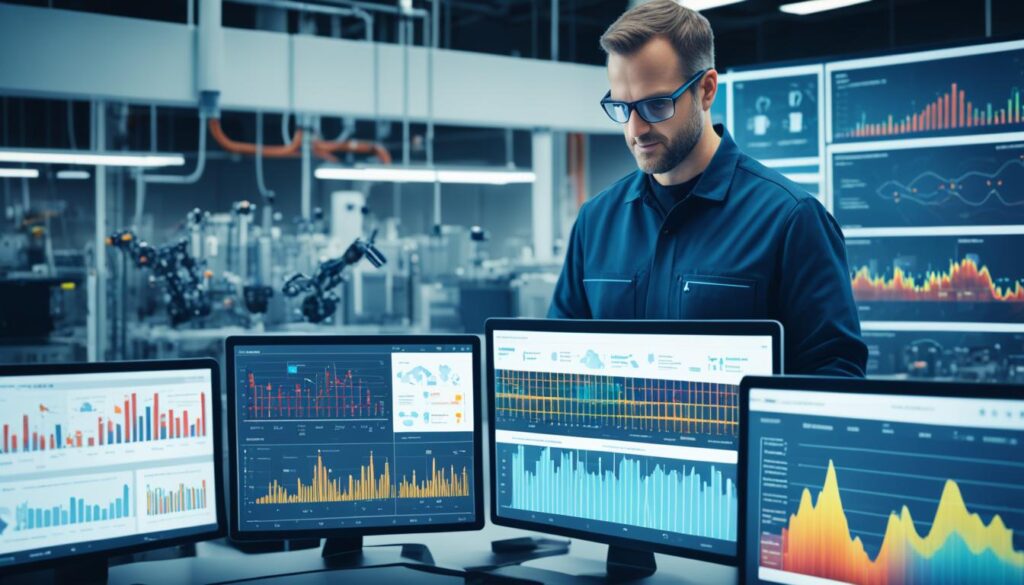
Enhancing Safety and Security Through Big Data in Automotive
Big Data plays a critical role in enhancing safety and security in the automotive industry. By analyzing sensor data, vehicles can detect potential dangers on the road, such as slippery conditions or obstacles, and send real-time alerts to drivers and other vehicles. This proactive approach to accident prevention can significantly enhance overall road safety.
Big Data also contributes to automotive cybersecurity, with data analysis identifying and combating cyber threats. Automakers are implementing data-driven security measures, such as vehicle tracking systems and authentication functions, to prevent vehicle theft and ensure the safety of connected cars.
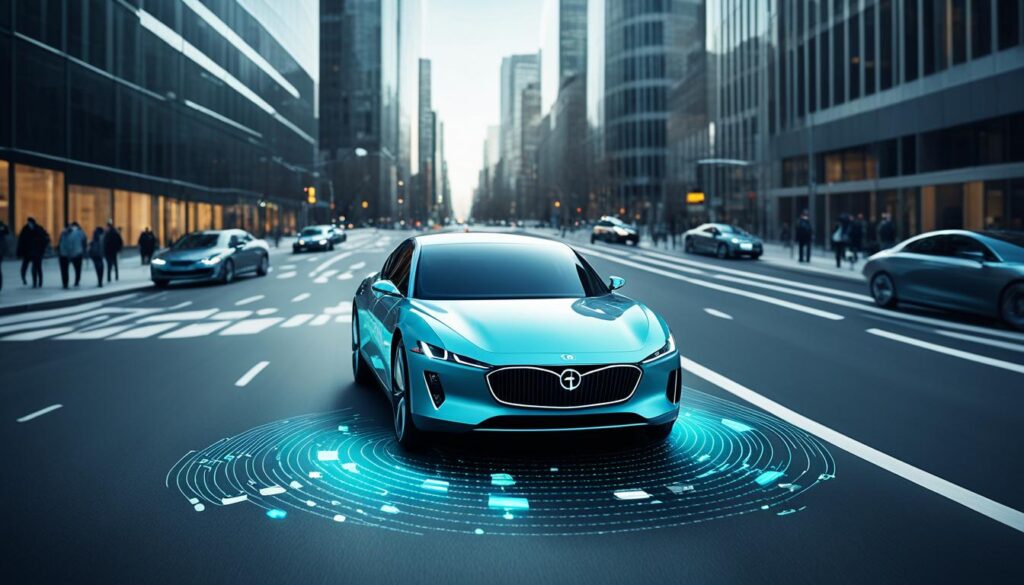
“Big Data is transforming the automotive industry by enabling real-time monitoring and alert systems that can help prevent accidents and enhance security. The ability to analyze sensor data and provide timely warnings to drivers and other vehicles is a significant advancement in road safety. Furthermore, automotive cybersecurity measures driven by Big Data analysis are crucial for preventing vehicle theft and ensuring the security of connected cars.”
Real-Time Alerts for Accident Prevention
Big Data enables vehicles to collect and analyze sensor data in real-time, allowing them to detect potential hazards on the road. By leveraging this data, vehicles can send instant alerts to drivers and other vehicles, enabling them to take immediate action to avoid accidents. This real-time alert system significantly enhances accident prevention and promotes safer driving practices.
Automotive Cybersecurity
As the automotive industry becomes more connected, the importance of automotive cybersecurity continues to grow. Big Data analysis plays a crucial role in identifying and combatting cyber threats that can compromise the safety and security of connected cars. By implementing data-driven security measures, such as vehicle tracking systems and authentication functions, automakers can protect vehicles from theft and ensure the privacy of sensitive data.
Overall, the integration of Big Data in the automotive industry enhances safety and security by enabling real-time alert systems for accident prevention and robust cybersecurity measures. These advancements contribute to creating a safer and more secure driving experience for all.
| Data-Driven Safety Measures | Data-Driven Security Measures |
|---|---|
| Real-time monitoring and alert systems | Vehicle tracking systems |
| Sensor data analysis for accident detection | Authentication functions |
| Instant alerts for potential hazards | Cyber threat identification |
Big Data’s Impact on the Future of Autonomous Vehicles
Big Data plays a pivotal role in the development of autonomous vehicles. The torrents of data generated by sensors and cameras on self-driving cars are essential for AI training and improving navigation. By analyzing sensor data, autonomous vehicles can enhance their navigation capabilities and improve safety.
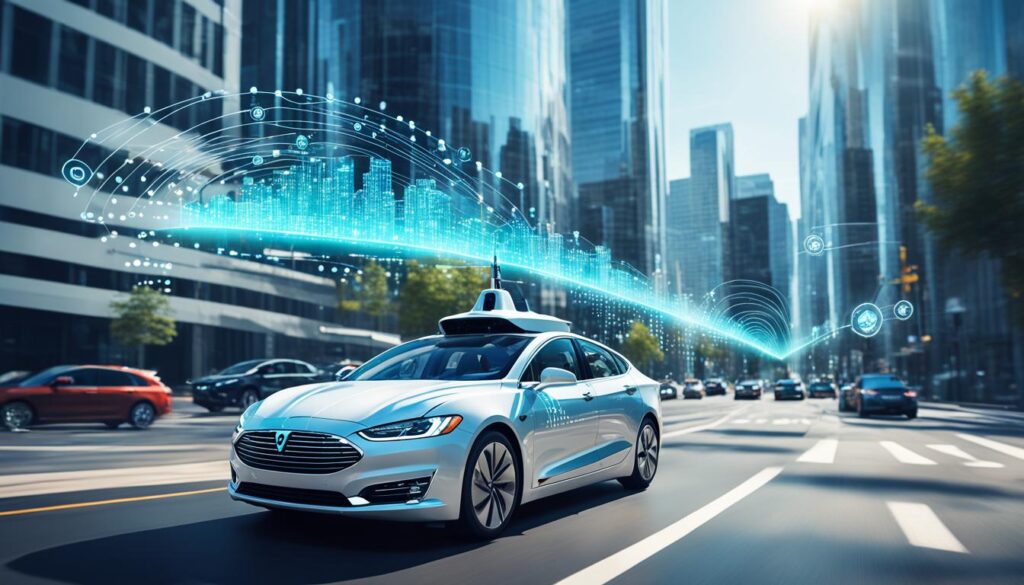
Big Data enables interconnectedness between physical spaces, such as homes, offices, and cars, creating a connected future. This interconnectedness allows for seamless transfer of data and enhanced experiences. For example, an autonomous vehicle can receive information about a user’s preferred temperature and adjust it accordingly. With Big Data, autonomous vehicles have the potential to transform the way we travel and live.
Enhancing Safety with Sensor Data Analysis
One of the key areas where Big Data excels in autonomous vehicles is safety improvement. Sensor data analysis provides real-time information about the vehicle’s surroundings, allowing it to detect potential hazards and respond accordingly. This can include identifying pedestrians, monitoring traffic conditions, and predicting potential collisions. By leveraging Big Data, autonomous vehicles can make split-second decisions to prevent accidents and keep occupants and pedestrians safe.
AI Training for Highly Efficient Self-Driving Cars
AI training is another crucial aspect of autonomous vehicles, and Big Data fuels this training process. The massive amount of data collected from sensors and cameras is used to train AI algorithms to make intelligent decisions. The algorithms learn from patterns in the data, allowing the vehicle to adapt to changing road conditions, traffic situations, and potential hazards. Big Data-driven AI training enables self-driving cars to continuously improve their driving capabilities and deliver highly efficient and reliable performance.
| Benefits of Big Data in Autonomous Vehicles | Examples |
|---|---|
| Enhanced navigation | An autonomous vehicle leverages Big Data to access up-to-date mapping and location information to optimize the route and provide accurate guidance. |
| Improved traffic management | By analyzing real-time traffic data, autonomous vehicles can identify congested areas and suggest alternative routes to optimize travel time. |
| Efficient energy consumption | Big Data analysis allows self-driving cars to adjust their speed and energy usage based on traffic conditions, resulting in improved fuel efficiency. |
| Personalized in-car experiences | Using Big Data analytics, autonomous vehicles can customize each passenger’s experience by adjusting seat positions, climate control, and entertainment options. |
| Accident prevention | Sensor data analysis enables autonomous vehicles to detect potential hazards and take proactive measures to prevent accidents. |
| Seamless integration with smart homes | Through Big Data, self-driving cars can seamlessly connect with smart home devices, allowing for automatic control of lights, temperature, and security systems. |
The success of autonomous vehicles depends on how key stakeholders, including car manufacturers, leverage Big Data to enhance performance, safety, and the overall driving experience. With continuous advancements in technology and the power of Big Data, the future of autonomous vehicles holds immense promise for a connected and autonomous driving era.
Conclusion
Big Data has the potential to revolutionize the automotive industry, driving efficiency, innovation, safety, and customer experiences. With the integration of technologies like AI, ML, and IoT, vehicles are becoming intelligent machines that rely on data insights for optimal performance. Automotive companies are leveraging Big Data to make effective business decisions, improve manufacturing processes, enhance maintenance strategies, and create personalized in-car experiences.
As the industry moves towards autonomous vehicles, Big Data will play a crucial role in enabling a connected future. By utilizing Big Data effectively, automakers can leverage technology to unlock transformative possibilities and achieve automotive excellence in a data-driven future.
In conclusion, the automotive industry is in the midst of a data-driven transformation. The transformative possibilities offered by Big Data are immense, from enhancing safety on the roads to creating personalized in-car experiences. Leveraging technology and embracing data-driven strategies are key to staying ahead in this rapidly evolving industry. With Big Data at the forefront, the automotive industry is poised to embark on an exciting journey towards a more efficient, connected, and innovative future.
FAQ
What is the role of Big Data in the automotive industry?
Big Data is transforming the automotive industry by enabling data-driven business decisions, improving manufacturing processes, enhancing maintenance strategies, and creating personalized in-car experiences.
What are some cutting-edge trends in Big Data for the automotive industry?
Some cutting-edge trends include predictive maintenance, connected cars, advanced driver assistance systems, personalized in-car experiences, optimized supply chains, fuel efficiency, telematics and insurance, autonomous driving, consumer insights, and automotive cybersecurity.
How is Big Data revolutionizing decision making in the automotive industry?
Big Data enables data-driven business decisions by providing better insights into customer behavior, market trends, and operational efficiency. It helps automotive manufacturers optimize resource utilization, drive innovation, and make data-driven strategies.
What is the impact of Big Data on automotive manufacturing and maintenance?
Big Data analytics improves quality control and manufacturing efficiency by analyzing sensor data to identify potential issues and optimize production processes. In maintenance, predictive analytics plays a crucial role in proactive maintenance, tracking the condition of critical components and providing timely service to reduce breakdowns and improve reliability.
How does Big Data enhance safety and security in the automotive industry?
By analyzing sensor data, vehicles can detect potential dangers on the road and send real-time alerts to drivers and other vehicles, enhancing accident prevention. Big Data analysis also helps identify and combat cyber threats, enabling data-driven security measures to prevent vehicle theft and ensure the safety of connected cars.
How does Big Data impact the future of autonomous vehicles?
Big Data is crucial for the development of autonomous vehicles as it trains AI algorithms for navigation and safety using data from sensors and cameras. It enhances the navigation capabilities of self-driving cars and contributes to creating a connected future.
What is the conclusion regarding Big Data in the automotive industry?
Big Data has the potential to revolutionize the automotive industry, driving efficiency, innovation, safety, and customer experiences. It is crucial for decision making, manufacturing, maintenance, safety, security, and the future of autonomous vehicles, allowing automakers to achieve automotive excellence in a data-driven future.

